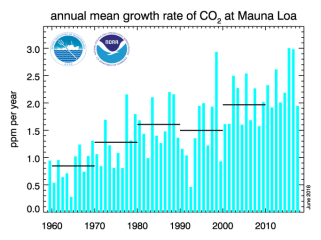hobbsyoyo
Deity
- Joined
- Jul 13, 2012
- Messages
- 26,575
This article is first twisting some facts and continues on those twisted facts with "I believe".
First the key part of the article here, before shredding it.
"The sea level rose when ocean temperature increased by 0.5 degree Celsius between 1920 and 1940, but rose at the same constant rate when ocean temperature cooled between 1945 and 1975"
If you look at the graph below, you can see that between 1940 and 1946 the surface sea temperature goes up with roughly 0.5 C and goes down with 0.5 C, after which it increases, accelerating over time, but in 1975 there is a dip.
So I have to assume that the statement is based on sea surface temperature and not the average temperature of the ocean water from bottom to surface, which is real driver of ocean water expansion.
So... this statement made in 2018 is using three deceiving time dates of the past to get the desired statement as conclusion.
Simply drawing a best fit through the measured temperatures from 1920-1975 would already show that the temperature is steadily going up and the conclusion of the article on temperature is nonsense.
https://www.epa.gov/climate-indicators/climate-change-indicators-sea-surface-temperature
View attachment 497805
"I believe that evaporation of sea water offsets thermal expansion. The evaporated water causes an increase in precipitation, which turns into snow and ice as it rains over the continent of Antarctica"
Climate change is increasing the amount of water that evaporates from the oceans.
Increased evaporation from higher temperature of the surface seawater, from higher temperature of the air for more water vapor capacity, from higher wind velocity for better air mixing and more vapor capacity, from more sea surface from more and higher waves and from more foam (driven by that higher wind velocity), etc, etc.
I guess not easy to model the increase as function of temperature....... especially the area around Antarctica where the high sea states are of the Roaring Fourties...... so you can say and believe what you want....
However... we can measure the change of the amount of land snow and land ice of Antarctica (the sea ice does not count to lower sea level, because it floats in the sea).
At least as long as NASA is allowed to do that and to make the results public.
From the NASA (2015):
So this precipitation on Antarctica is as far as we can measure now effectively only 0.23 mm sealevel decrease per year, and not offsetting the thermal expansion of the ocean water at all, as the article wants us to believe.
I actually have some good news on the NASA front. The new NASA administrator (Jim Bridenstine - formerly a Congressman from Oklahoma) has fully come around on climate change since taking the job. He previously took a hard stance against AGW while he in Congress (and his election hopes sort of depended on it) but since taking office he says he 'read a lot' on the subject and now believes AGW is real and it's NASA's job to continue studying it.


